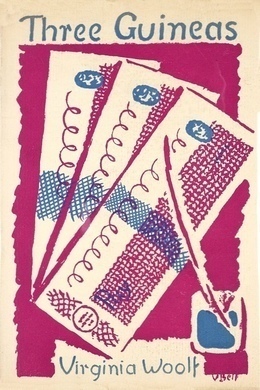
-
EPUB 253 KB
-
Kindle 348 KB
-
Support epubBooks by making a small $2.99 PayPal donation purchase.
This work is available for countries where copyright is Life+70 or less.
Description
Three Guineas is written as a series of letters in which Woolf ponders the efficacy of donating to various causes to prevent war. In reflecting on her situation as the ‘daughter of an educated man’ in 1930s England, Woolf challenges liberal orthodoxies and marshals vast research to make discomforting and still-challenging arguments about the relationship between gender and violence, and about the pieties of those who fail to see their complicity in war-making. This pacifist-feminist essay is a classic whose message resonates loudly in our contemporary global situation.
360 pages with a reading time of ~5.50 hours (90114 words), and first published in 1938. This DRM-Free edition published by epubBooks, 2014.
Community Reviews
There are currently no other reviews for this book.
Excerpt
Three years is a long time to leave a letter unanswered, and your letter has been lying without an answer even longer than that. I had hoped that it would answer itself, or that other people would answer it for me. But there it is with its question–How in your opinion are we to prevent war?–still unanswered. It is true that many answers have suggested themselves, but none that would not need explanation, and explanations take time. In this case, too, there are reasons why it is particularly difficult to avoid misunderstanding. A whole page could be filled with excuses and apologies; declarations of unfitness, incompetence, lack of knowledge, and experience: and they would be true. But even when they were said there would still remain some difficulties so fundamental that it may well prove impossible for you to understand or for us to explain. But one does not like to leave so remarkable a letter as yours–a letter perhaps unique in the history of human correspondence, since when before has an educated man asked a woman how in her opinion war can be prevented?– unanswered. Therefore let us make the attempt; even if it is doomed to failure. In the first place let us draw what all letter-writers instinctively draw, a sketch of the person to whom the letter is addressed. Without someone warm and breathing on the other side of the page, letters are worthless. You, then, who ask the question, are a little grey on the temples; the hair is no longer thick on the top of your head. You have reached the middle years of life not without effort, at the Bar; but on the whole your journey has been prosperous. There is nothing parched, mean or dissatisfied in your expression. And without wishing to flatter you, your prosperity– wife, children, house–has been deserved. You have never sunk into the contented apathy of middle life, for, as your letter from an office in the heart of London shows, instead of turning on your pillow and prodding your pigs, pruning your pear trees–you have a few acres in Norfolk–you are writing letters, attending meetings, presiding over this and that, asking questions, with the sound of the guns in your ears. For the rest, you began your education at one of the great public schools and finished it at the university. It is now that the first difficulty of communication between us appears. Let us rapidly indicate the reason. We both come of what, in this hybrid age when, though birth is mixed, classes still remain fixed, it is convenient to call the educated class. When we meet in the flesh we speak with the same accent; use knives and forks in the same way; expect maids to cook dinner and wash up after dinner; and can talk during dinner without much difficulty about politics and people; war and peace; barbarism and civilization–all the questions indeed suggested by your letter. Moreover, we both earn our livings. But…those three dots mark a precipice, a gulf so deeply cut between us that for three years and more I have been sitting on my side of it wondering whether it is any use to try to speak across it. Let us then ask someone else–it is Mary Kingsley–to speak for us. ‘I don’t know if I ever revealed to you the fact that being allowed to learn German was ALL the paid-for education I ever had. Two thousand pounds was spent on my brother’s, I still hope not in vain.’ Mary Kingsley is not speaking for herself alone; she is speaking, still, for many of the daughters of educated men. And she is not merely speaking for them; she is also pointing to a very important fact about them, a fact that must profoundly influence all that follows: the fact of Arthur’s Education Fund. You, who have read Pendennis, will remember how the mysterious letters A.E.F. figured in the household ledgers. Ever since the thirteenth century English families have been paying money into that account. From the Pastons to the Pendennises, all educated families from the thirteenth century to the present moment have paid money into that account. It is a voracious receptacle. Where there were many sons to educate it required a great effort on the part of the family to keep it full. For your education was not merely in book-learning; games educated your body; friends taught you more than books or games. Talk with them broadened your outlook and enriched your mind. In the holidays you travelled; acquired a taste for art; a knowledge of foreign politics; and then, before you could earn your own living, your father made you an allowance upon which it was possible for you to live while you learnt the profession which now entitles you to add the letters K.C. to your name.
